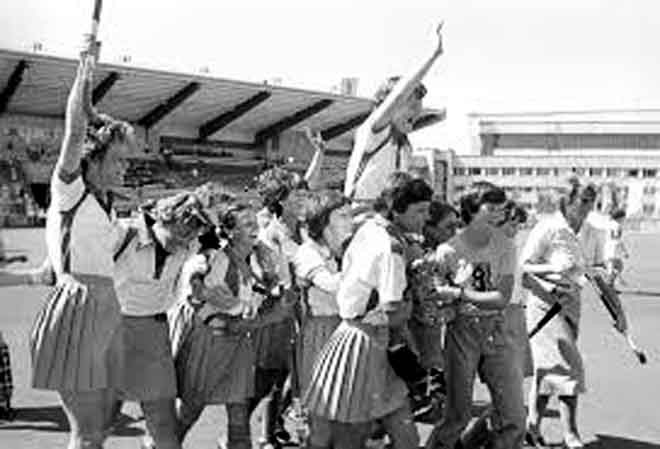

Great Britain had failed to qualify for Olympics hockey event in 1984 and they were not in the 12 teams originally named. But the erstwhile USSR pulled out of the Los Angeles Olympics due to political reasons.
The USA and many other countries had boycotted the 1980 Olympics in Moscow, protesting the Soviet Union’s invasion of Afghanistan.
In retaliation, most of the countries of former Soviet bloc didn’t come to the 1984 Olympics. Britain filled the slot vacated by the USSR. They took the opportunity with both hands. Against the odds, Britain topped the pool and eventually won the bronze medal. It was their first Olympic hockey medal since 1952. That success heralded the golden era of British hockey.
Just two years later, England were second at the 1986 World Cup (their only podium finish at any World Cup). In 1987, England played their first final of the Euro Hockey Nations Championships, and lost only on penalty strokes.
Then in 1988, the British hockey had its finest moment -- winning the Olympic gold. And it all began with that chance participation at the 1984 Olympics. However, four years earlier, Zimbabwe had done even greater wonders. Women’s hockey was included in the Olympics for the first time in Moscow in 1980. The newly-independent country of Zimbabwe (formerly Rhodesia) was not one of the originally participating teams.
Quite a few countries withdrew in protest against USSR’s occupation of Afghanistan. Zimbabwe were one of the replacements. The Zimbabwean girls saw astro-turf for the first time in their life upon their arrival in Moscow. But the bigger surprise was their performance on that turf.
Zimbabwe had a dream run and eventually became the first winners of women’s Olympic hockey. It was Zimbabwe’s first ever Olympic medal of any colour. The country did not win another Olympic medal until 2004.
When the change of hockey stick altered a player’s fortunes
Left full-back Khalid Bashir had been playing regularly for Pakistan since 1987. He had proved himself to be a solid and dependable defender but had been a poor converter of penalty corners till 1991: just one goal in all the three Champions Trophy events of 1988, 1989 and 1990 combined, three goals in the 1990 World Cup and one in the 1990 Asian games.
One of the all-time great full-backs, Munawwaruz Zaman was appointed Pakistan’s coach in 1991. He worked on Khalid. The main change that Munawwar brought about was not in Khalid’s style or technique but in the equipment that he was using. Yes! He changed Khalid’s hockey stick. The new stick was similar to the one used by Munawwar himself during his international career and which enabled him to score a bagful of goals on penalty corners.
Believe it or not, almost overnight, Khalid became the most fearsome penalty corner expert. He was Pakistan’s top scorer in the Champions Trophy editions of 1991, 1992 and 1993 with seven, five and six goals, respectively. He also topped his country’s score sheet in the 1992 Olympics with eight goals.
Missing a penalty stroke
Missing a penalty stroke at any stage of a match at any level is unforgettable for the team and the individual. What about missing as many as three penalty strokes in a single match? That too in a Pakistan-India tie, which was a series decider.
It happened in the fourth and last test match of the 1981 series, at Karachi. At that stage, the series was tied at one all (with one draw). India blew up all the three penalty strokes that came their way thus enabling Pakistan to win the test 4-2 and with it the series as well.
Three different Indian players tried their hand at the strokes but each of them failed. None of them even bothered the Pakistan goalkeeper Moinuddin as every effort went out of the goal.
However, that incident pales in comparison to what had happened to India in the 1973 World Cup. In the final, against the hosts Netherlands, India led 2-0 only to see the Dutch level the match before the stipulated 70 minutes. The match went into extra time but no one could score. The final entered the sudden death/golden goal period.
India obtained the best possible opportunity to annex the World Cup -- a penalty stroke in the sudden death period. In stepped their ace forward Govinda. What happened next must have been haunting him till today. Govinda misfired. And with it India lost the World Cup as the match went to the penalty strokes shootout which was won by the Netherlands. One of the two Indians to waste the penalty stroke during the shootout was Govinda, again.
Pakistan’s World Cup Victory Made in Japan
In World Cup 1971 when the Olympic champions Pakistan lost to hosts Spain in the last pool match, their title hopes were all but over.
The only way they could reach the semi-finals stage was almost unthinkable -- the mighty Netherlands not being able to beat minnows Japan.
If the Netherlands won, Pakistan were out. A draw meant Pakistan’s fortunes depended on the Spain--Australia match. Even then the best that Pakistan could hope for was a play-off for the semi-final.
To the surprise of everyone, Japan did Pakistan the greatest favour by beating the Netherlands 1-0. It was a one-sided match with the Dutch dominating throughout. Japanese goalkeeper Otsuka had the match of his life and the Netherlands failed to convert any of the 19 penalty corners that came their way.
So courtesy Japan, Pakistan made it into the semis and eventually won the first-ever World Cup.
Otsuka was named the goalkeeper in the World XI announced at the end of the World Cup. Moreover, he had the honour of being named the Player of the Tournament.